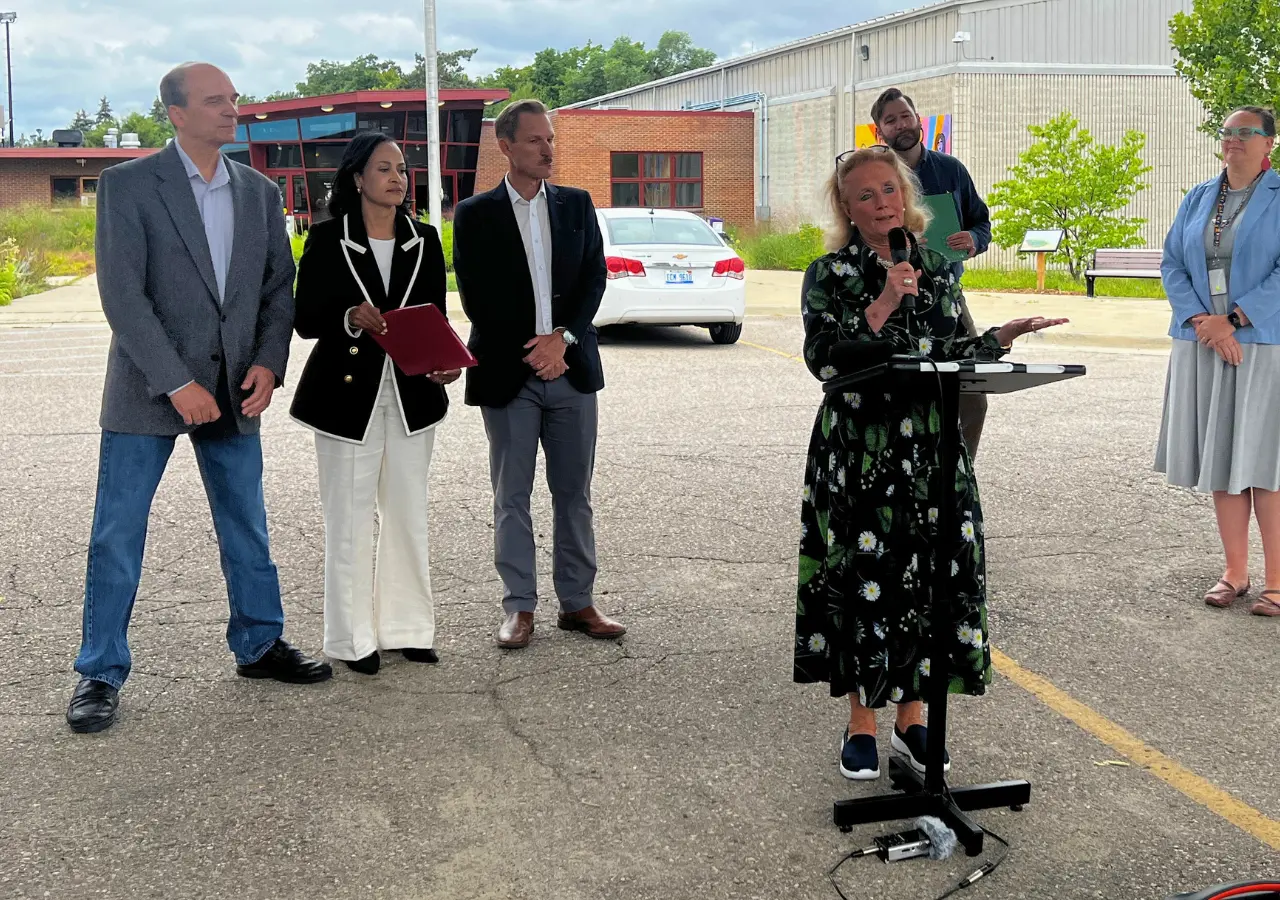
Kyle Kaminski/The 'Gander Newsroom
Clean energy advocates say President Donald Trump’s “One Big Beautiful Bill Act” is raising utility costs, canceling solar projects, and putting Michigan’s clean energy future at risk.
ANN ARBOR—Standing beneath a federally funded solar canopy at Veterans Memorial Park on Thursday, US Rep. Debbie Dingell (D-Ann Arbor) delivered a blunt warning to Michiganders: President Donald Trump’s “Big Beautiful Bill” isn’t lowering costs—it’s driving them up.
“Michigan families are going to see higher utility bills because of these policies, at a time when energy prices are skyrocketing,” Dingell told reporters. “Cutting solar [federal tax incentives] means fewer low-income households can access affordable, renewable power. Michiganders are going to be saddled with higher utility costs and it’s going to hurt economic development.”
With coal plants kept online, solar and wind projects scrapped, and federal tax credits stripped away, Dingell said Republican-led rollbacks on renewable energy policies are already making life more expensive for Michiganders, as well as stalling progress toward a clean energy future.
Utility bills are up. Jobs are down. And it’s likely going to get worse from here, she said.
Higher bills, fewer jobs
The press conference—organized by the Michigan League of Conservation Voters—brought together local leaders, clean energy advocates, and labor officials to sound the alarm about Trump’s “dirty” energy policies and the Republican-backed budget bill that’s enabling them.
“Trump promised to cut utility costs by 50%. Instead, he’s hiking costs, destroying jobs, and threatening Michigan’s auto industry by stripping away electric vehicle tax credits,” Dingell said. “The rollback of clean energy progress is going to raise costs. People’s utility bills are going up.”
The timing underscored her point. As advocates gathered in Ann Arbor this week, the Trump administration announced it was extending the life of Consumers Energy’s outdated J.H. Campbell coal plant—again. The West Michigan facility was slated to close in May—a move expected to save ratepayers $600 million by 2040. Instead, Trump ordered it to stay open another 90 days, a decision that’s already cost $30 million and could reach $100 million.
“Every day it remains open means more pollution in our air and higher energy costs,” said Lisa Wozniak, director of the Michigan League of Conservation Voters, in a statement on Thursday. “Our bills are already too high, and Trump’s reckless energy policies are making it worse.”
Bentley Johnson, federal government affairs director at the League of Conservation Voters, said the repeal of tax credits alone will raise household utility bills by up to $110 a year starting next year—and up to $400 within a decade. Federally funded projects on the chopping block include solar arrays at a senior housing center in Oakland County and at the Hillsdale Municipal Airport.
“We’re losing so many tools that help drive down costs, make people’s homes more comfortable, make them healthier,” Johnson said. “At a time when we should be doubling down on clean energy investment, the Trump administration is taking us in the opposite direction.”
Jobs on the line
Michigan’s clean energy sector employs more than 127,000 people—the sixth-most in the country. But that progress is at risk. John Richter of the Great Lakes Renewable Energy Association said Trump’s policies will raise the cost of solar projects by 37% and wind by 48%.
By peeling back federal incentives and increasing the cost of renewable energy projects, fewer Michiganders will pursue them—and that will ultimately drive up electric rates, exacerbate the climate crisis, and slow the state’s transition to cleaner forms of energy, Richter explained.
“Our electric rates will go up even faster than they have been,” he said. “These higher electric rates hit household budgets directly, and they also act as a damper on economic expansion.”
Jonathan Smith, chief deputy director of the Michigan Department of Labor and Economic Opportunity, also noted that Michigan had been on track to create at least 750 new jobs through the now-canceled Solar for All program. Those jobs, he said, are no longer coming to fruition.
“These repeals have devastating consequences—not just for the environment, but for the pocketbooks of Michiganders and their families who are no longer going to have access to these good-paying jobs,” Smith said.
Ann Arbor Sustainability Director Missy Stults also reminded the crowd of what’s at stake.
She pointed to the solar canopy above them—funded through the Bipartisan Infrastructure Law—as proof that federal investments work. The project has already saved residents millions in utility costs and made critical facilities like fire stations more resilient to outages, she said.
“Every home and business that gets solar sees bill reductions. We’ve helped people save $24 million in lifetime energy costs,” Stults said. “That’s real money that stays in our economy. But now, because of decisions being made in DC, families across Michigan are going to pay more.”
Dingell’s call to action
For Dingell, the fight for cleaner forms of energy is both personal and political.
She said she’s been struggling with asthma worsened by wildfire smoke from Canada—a reminder, she said, that climate change is real and already harming Michiganders’ health.
“Michigan has been a leader on clean energy and we need to keep it that way,” she said.
Dingell told The ‘Gander that Congress can’t undo all of Trump’s damage, but Michigan voters can make a big difference by electing new leadership in the next statewide election.
“Elections have consequences. The next election is November of 2026. When we win, we are going to have to move very quickly,” Dingell said. “But we can’t do this political ping-pong ball back and forth. The American people have to speak up and speak out. You can’t just be quiet.”
READ MORE: Trump slams brakes on Michigan’s clean energy future
Don’t miss Michigan’s biggest stories—follow The ‘Gander on X.
Support Our Cause
Thank you for taking the time to read our work. Before you go, we hope you'll consider supporting our values-driven journalism, which has always strived to make clear what's really at stake for Michiganders and our future.
Since day one, our goal here at The 'Gander has always been to empower people across the state with fact-based news and information. We believe that when people are armed with knowledge about what's happening in their local, state, and federal governments—including who is working on their behalf and who is actively trying to block efforts aimed at improving the daily lives of Michigan families—they will be inspired to become civically engaged.


Nessel seeks to slash DTE half-billion-dollar rate hike request by 75%
BY BEN SOLIS, MICHIGAN ADVANCE MICHIGAN—Attorney General Dana Nessel filed testimony on Friday in DTE Energy’s latest rake hike request, which is...

Here’s how many Michiganders in Flint and the Tri-Cities will lose SNAP benefits in 2025—and the elected politician who tried to stop it
Trump’s tax bill will take around 46,000 people off SNAP in Michigan’s 8th Congressional District. Rep. Kristen McDonald Rivet voted against it....

Here’s how many people in Southwest Michigan will lose SNAP benefits in 2025—and the elected politician who made it happen
About 25,000 people in the Holland-Kalamazoo region are waiting to hear if Rep. Bill Huizenga will run for reelection in 2026, after he voted to...

Here’s how many Michiganders in Macomb and Oakland counties will lose SNAP benefits in 2025—and the elected politician who made it happen
The representative who voted to take away food benefits from around 36,000 people in his district plans to run for governor. President Donald Trump...

Here’s how many Michiganders in the Lansing area will lose SNAP benefits in 2025—and the elected politician who made it happen
The representative who voted to take away food benefits from around 23,000 people in his district plans to run for reelection next year. President...





